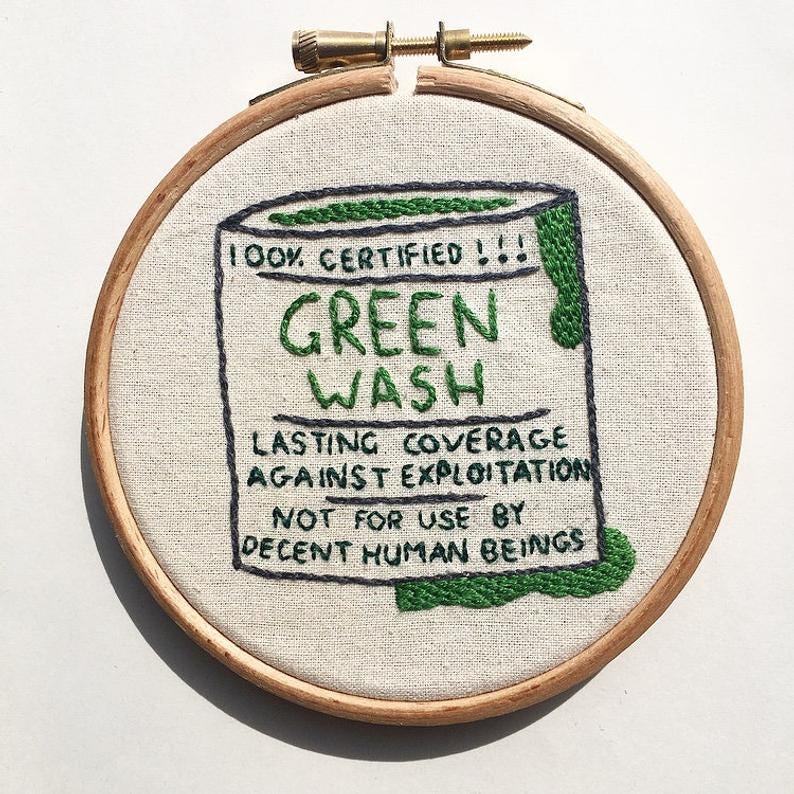What is greenwashing? Put quickly + simply (because I have the tendency to go on and on), greenwashing is the term for when brands exaggerate or fabricate claims of their sustainability which misleads consumers and puts their integrity into question. This happens in fashion as well as beauty, auto, energy, tech, furniture, food and more. It’s not about a company making authentic positive change for the masses - I’m all for that - it’s about a dangerous marketing tactic that fools shoppers into believing they are making the right choices, while hiding the true cost.
Other than using third-party indicators like Good On You and Fashion Revolution’s Transparency Index, here’s how to spot fashion brand greenwashing in the wild, and some recent examples of fashion’s worst offenders:
>> ‘Capsule collection’ | When a brand puts out a small collection (eg. 50 items) of clothing that they claim is ‘sustainable’ or makes their brand sustainable, but it is such a tiny percentage of their overall production that it barely makes a drop in the ocean. It also involved huge investment in ‘sustainable’ marketing campaigns, with plenty of ‘natural’ and ‘green’ imagery, See H&M Conscious, ASOS Responsible Edit, Mango Committed, Topshop Considered, Little Mistress Guilt Free.
>> ‘Sustainable fabrics’ | This means nothing! What is a ‘sustainable fabric’ anyway? Is it organic, is it natural, is it recycled, is it deadstock? Like with Zara parent company Inditex’s recent announcement of ‘ambitious’ sustainability goals, these claims are kept extremely vague, with no details on sourcing, to protect the brand from having to actually overhaul their materials.
>> ‘Ethically made’ | Particularly when cost of a new garment is as low as £5-£20, claims that it’s made ethically are questionable to say the least, without any solid proof of minimum wages being paid (like the Living Wage mark) or working conditions being an acceptable standard (like the Fair Wear mark). Obvious examples here are Primark, Boohoo and Missguided. (hint - the ETI is not enough).
>> ‘Vegan fashion’ | Remember, vegan does not mean sustainable. Plastics, like polyester and PVC, are technically vegan, but arguably do more damage to the environment than any biodegradable animal fibre would. Besma from curiously Conscious just wrote an excellent blog post all about this conundrum here. Matt & Nat are one ‘vegan’ brand recently called out for their greenwashing tactics.
>> ‘Closed loop’ | Many high street retailers have been participating in clothing ‘take-back’ schemes, for example M&S, H&M and Zara, claiming that they will recycle unwanted garments dropped in boxes at their stores. One key problem here is that vouchers are usually provided as a reward which encourages further destructive consumption, and the other issue is the serious lack of transparency as to whether these clothes end up getting responsibly recycled at all. Finally, the term ‘closed loop’ is misused here, because post-consumer clothing cannot be endlessly recycled, particularly when made from low quality fabrics - eventually, they will still end up in the bin - this is an end-of-pipe add-on, not a circular economy solution.
Image [above] by the extremely talented Tickover, an embroidery artist raising awareness of ethical fashion, one stitch at a time. Go and follow her on Instagram.
NEWSFLASH!
It’s been a jam-packed fortnight of incredible sustainable fashion journalism - get ready to read up!
The Independent | H&M accused of greenwashing (duh!)
Vox | Fashion has a misinformation problem. That’s bad for the environment.
Grazia | BAFTAs: The night the A-list ignored a sustainable dress code
Vice | How 'not buying clothes' became the new buying clothes
Fast Company | It’s time to regulate fashion the way we regulate the oil industry
Vogue | Purpose is a buzzword, but what does it really mean in fashion?
The Guardian | MP sounds alarm over UK fast fashion factories
Business of Fashion | How Copenhagen became fashion’s sustainability capital
Vox | Fast fashion, explained
Evening Standard | Trashion: the ethical fashion brands making waste cool
Hole & Corner | Flax: the wonder plant
Vogue | The great revolution: a reflection on the past decade of fashion
ARE YOU LISTENING?
Wardrobe Crisis | Amber Valletta - Sustainable Fashion's Favourite Face
BBC Sounds | Patrick Grant: Making Fashion Sustainable
The Sustainable Style Podcast | Cotton Farming in India: A Major Problem
The Business of Fashion | Alok Menon on Why Clothes Have No Gender
Conscious Chatter | Elizabeth Cline: The Conscious Closet
EASY CLIMATE ACTION
Looking for a noutfit (my Grandma’s word for ‘new outfit’) for Valentine’s Day or a Spring wedding? Try rental instead of buying - I’ve heard great things about Onloan, By Rotation, Hurr and Nu Wardrobe (Nu - if you’re reading this, Edinburgh wants to join the tribe!)
Join the a Valentine’s Day Climate Strike in a city near you - declare your love for the planet and compassion for all who reside on it. Now that sounds like my dream date.
SOMETHING FOR THE WEEKEND

I wrote an article for Cosmopolitan (eep!) inspired by Lauren Bravo’s new book, How To Break Up With Fast Fashion all about my own rocky journey from fast fashion addict to loved-up ethical aficionado.
Read it here for my top tips: I've just got out of a toxic relationship... with fast fashion
SUSTAINABLE FASHION BRAND OF THE FORTNIGHT
Thanks for reading the second issue of The Ethical Fashion Roundup, see you in two weeks!
Follow me on Instagram for ethical outfit inspo, or Tweet me to feedback on the newsletter - what do you think about greenwashing?





